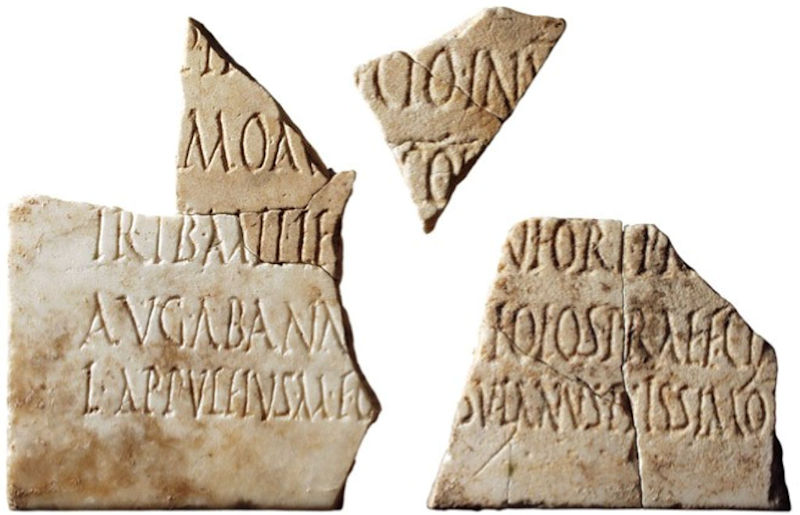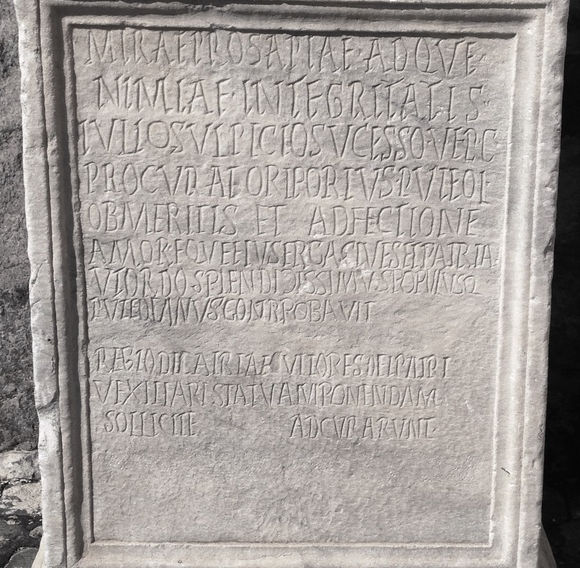The involvement of the Imperial government with Puteoli presents remarkable similarities with the situation in Ostia-Portus. Claudius was concerned about the safety of the stored grain in both ports:
Puteolis et Ostiae singulas cohortes ad arcendos incendiorum casus collocavit. He stationed a cohort at Puteoli and one at Ostia, to guard against the danger of fires. Suetonius, Claudius 25,2. Translation J.C. Rolfe. It is virtually certain that Petronius' famous cena Trimalchionis ("Trimalchio's dinner") is set in Puteoli, in August of 64 or 65 AD. Here the behaviour of the fire fighters (vigiles), patrolling in the neighbourhood (regio), is described as follows:
Ibat res ad summam nauseam, cum Trimalchio ebrietate turpissima gravis novum acroama, cornicines, in triclinium iussit adduci, fultusque cervicalibus multis extendit se super torum extremum et: "Fingite me, inquit, mortuum esse. Dicite aliquid belli." Consonuere cornicines funebri strepitu. Vnus praecipue servus libitinarii illius, qui inter hos honestissimus erat, tam valde intonuit, ut totam concitaret viciniam.
Itaque vigiles, qui custodiebant vicinam regionem, rati ardere Trimalchionis domum, effregerunt ianuam subito et cum aqua securibusque tumultuari suo iure coeperunt.The thing was becoming perfectly sickening, when Trimalchio, now deep in the most vile drunkenness, had a new set of performers, some trumpeters, brought into the dining-room, propped himself on a heap of cushions, and stretched himself on his death-bed, saying, "magine that I am dead. Play something pretty." The trumpeters broke into a loud funeral march. One man especially, a slave of the undertaker who was the most decent man in the party, blew such a mighty blast that the whole neighbourhood was roused.
The night watchmen, who were patrolling the streets close by, thought Trimalchio's house was alight, and suddenly burst in the door and began with water and axes to do their duty in creating a disturbance.Petronius, Satyricon 78. Translation M. Heseltine. An important discovery was made during excavations in 2001 and 2003 on the island of Pantelleria, near Sicily. Fragments of the funerary inscription were found of Marcus Appuleius [---], set up by his son. The deceased had probably been born on the island. Part of the last lines could be completed to procuratori Augusti ab annona ad Puteolos, so the office "Imperial procurator for the food supply at Puteoli". This man had been responsible for financial and organizational issues. His Ostian counterpart was the procurator Augusti Ostis ad annonam. He must have held the office in the period 112-116 AD.

Fragments of an inscription from Cossura, Pantelleria. Last three lines:
TRIB(uno) MIL(itum) LEG(ionis) [II Traia]N(ae) FORT(is) PR[aef(ecto) alae --- proc(uratori)]
AVG(usti) AB ANN[on(a) ad Pu]TEOLOS PRAEF(ecto) CLA[ssis Alexandrinae?]
L(ucius) APPVLEIVS M(arci) F(ilius) Q[uir(ina) In]SVLANVS PIISSIMO P[atri faciund(um) curavit?]
EDR159619. Alföldy 2005. Photo: EDH.In Puteoli a statue was erected for the well-being of Antoninus Pius by Chrysanthus, who was Imperial paymaster for the grain, active in Puteoli and Ostia: Chrysanthus Aug(usti) disp(ensator) a fruminto Puteolis et Ostis.
Base for a statue set up by Chrysanthus.
Found in Pozzuoli, known since the 17th century.
EDR116016. Photo: EDH.Another important inscription, from the reign of either Hadrianus or Antoninus Pius, was discovered in 2002 in Carteia on the Strait of Gibraltar. The inscription records the dedication of the statue of a man whose name is lost by Publius Perellius Maximus. It contains the phrase procuratori Augusti rationis Putiolanae ab annona. Ratio stands for "running the affairs", and presumably we must understand procurator rationis privatae. This anonymous official had then been responsible for the use of the private means of the Emperor in Puteoli for the food supply.
A further recent discovery was made in 2007 in Uchi Maius in Africa Proconsularis (Henchir Douamis, Tunisia). The city erected a statue for Quintus Marcius Macrinus in the years 230-250 AD. Unfortunately the inscription on the base has much damage. Macrinus had been procurator sexagenarius Puteolis ad annonam item per Africam ad frum(enta) ...: "sexagenarian procurator in Puteoli for the food supply, also for Africa to convey grain ...". It has been suggested that we are dealing here with an exceptional appointment, and that in a time of crisis, problematic supply from Egypt and famine, grain was brought from Africa to Puteoli (so not further on to Ostia-Portus and Rome), using the harbour of Carthago.
Inscription from Carteia, Spain.
AE 2012, 752. Alföldy 2012. Photo: Hispania Epigraphica.[---]
CLAVDIAE P[iae Fid(elis)]
PROC(uratori) AVG(usti) R[ation(is)]
PVTIOLANAE AB ANN[on(a)]
P(ublius) PERELLIVS MAXI[mus]
DEC(urio) ALAE [II]
THRACVM
D(ono) D(edit)Q(uinto) MARCIO MACRINO
PROCVRA[t]IONE SEXAGE
NARIA PVTEOLIS AD ANNO
NAM ITEM [per Afr]ICAM AT
FRVM[enta fusa / -entum comp(arandum)? procura]TO
[ri Au]G(usti) C[entenario? tractu]VS
[K]ARTHA[giniensis] / [K]ARTHA[ginis] V+
++ [---]I+[---]
[---]IA IN PIII+++[---]
[o]B [innoc?]ENTIAM SINGVLA[rem ---]
[---] ETIAM CONGIA[rium ---]
[---] CIVES MVLTO [---]
COLONIA MARIANA AVGVSTA AL[e]
XANDRIANA VCHI MAIVS
D(ecreto) D(ecurionum) P(ecunia) P(ublica)
Transcription of the inscription from Uchi Maius,
Tunisia. The + means that one letter is missing.
AE 2012, 1885. Mastino in Khanoussi-Mastino 2012.In the late third or early fourth century a statue of Iulius Sulpicius Successus was erected by the regio Decatriae. Successus had been procurator portus Puteolanorum, "procurator of the port of the Puteolans". The equivalent of this harbour master in Ostia and Portus was the procurator Portus Ostiesis, later procurator Portus Utriusque. The Puteolan office surely already existed in the first century, as in Ostia, where it was created by Claudius.

SVCESSI
MIRAE PROSAPIAE ADQVE
NIMIAE INTEGRITATIS
IVLIO SVLPICIO SVCESSO V(iro) E(gregio) P(atrono) C(oloniae)
PROCVRATORI PORTVS PVTEOL(anorum)
OB MERITIS ET ADFECTIONE
AMOREQUE EIVS ERGA CIVES ET PATRIA(m)
VT ORDO SPLENDIDISSIMVS POPVLVSQ(ue)
PVTEOLANVS CONPROBAVIT
REGIO DECATRIAE CVLTORES DEI PATRI
VEXILLARI STATVAM PONENDAM
SOLLICITE ADCVRARVNT
Base for a statue for Iulius Sulpicius Successus,
set up by the regio Decatriae.
Found in Pozzuoli in 1965.
EDR075343. Photo: EDR.